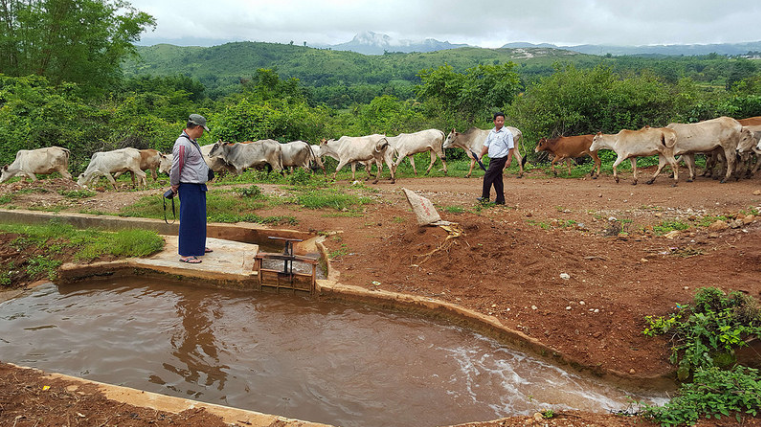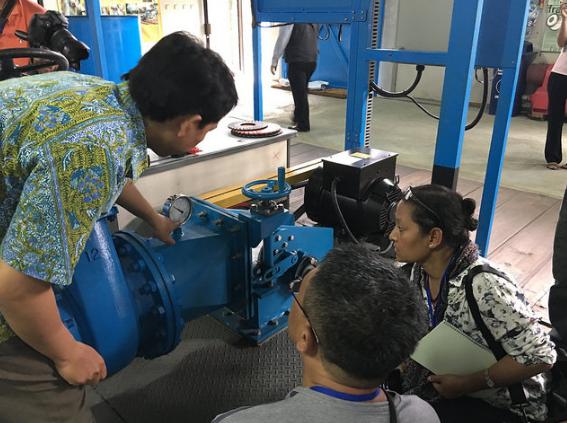
The following is Part 2 of an in-depth interview (access Part 1 here) with Dipti Vaghela (left) co-founder of Hydro Empowerment Network (HPNET). The organization, founded in 2012, brings practitioners a knowledge platform to advance micro-hydro power. HPNET focuses primarily on “policy, technology, and socio-environmental aspects for sustainability.” Vaghela, who serves as HPNET’s coordinator, talks to Microgrid News & Insight about her vision for HPNET and the future of micro-hydro power.
MGN: How did your interest in micro-hydro power come about and develop?
DV: My background in mechanical engineering and product design, along with my family’s roots in rural India, led me to spend a year volunteering India prior to grad school. That year I fell in love with micro-hydro technology while taking part in an installation in a remote village of Ladakh, India. Later, over a 7-year span of anchoring a statewide rural energy program, I had the rare opportunity to rehabilitate and iteratively advance a cluster of community-based micro hydro projects, where I witnessed the magical interconnection of vibrant watersheds, local ingenuity, and access to electricity.
MGN: HPNET’s work is primarily in south and southeast Asia. Are you optimistic about developing countries on other continents?
DV: Micro-hydro is relevant to any developing country with hilly with underground springs or river tributaries that provide perennial flow. There is micro-hydro in North America, South America, Africa, and Australia. HPNET currently focuses on building productive knowledge exchange relationships in south and southeast Asia, but since we are being contacted by practitioners in Africa for support, in the future we may help to support a practitioners platform there.
MGN: Which countries have had most success with micro-hydro? Why were those projects particularly successful and how can that success be duplicated?
DV: I have quite a few examples to share, they are described in detail on our website:
Nepal, with its abundant natural resources, has been at the root of micro hydro in Asia. This couldn’t have happened without the World Bank and other international support to provide long-term capacity building and policy innovation that strengthens the local private sector.

Indonesia has six ministries doing micro-hydro! This is mostly thanks to [German international cooperation provider for sustainable development] GIZ’s work over the last three decades in building local capacities of the private sector and the government to do scaled micro-hydro programs.
The World Bank’s RERED program, excellently managed by the DFCC bank, has been the path-breaker to developing Sri Lanka’s scaled micro-hydro program. This program involves local entrepreneurs, local government, and VECS. In recent years, the efficient institutional framework set up by the program has led to much-needed policy change and innovation, such as interconnected micro-hydro.
In all these countries, the governments have a great understanding of developing micro-hydro projects while at the same time nurturing the local private sector. They also focus on encouraging local banks to provide financing. In all these cases, practitioners are so advanced and sites have been mostly tapped such that their talent is now contributing to other regions, such as Myanmar, India, and Africa.
MGN: What are HPNET’s proudest accomplishments thus far?

Through our knowledge exchange events, research, and advocacy work — using a four-step approach to help ensure impact on the ground — and with deep commitment of our members, we have been able to accomplish much since our start in 2013. First, we facilitate peer-to-peer inspiration through hands-on training, collaborative research, and exchange at our annual gatherings. Next is bridging perspective gaps among multi-actors, including local entrepreneurs, government agencies, policy consultants, technical service providers, researchers, and advocacy groups. Customized strategy development helps overcome each obstacle and challenge, which vary widely. Finally, our goal is to inspire the next generation in all areas, from field work to policy-making to financing.
MGN: What are HPNET’s plans for the near future?
Our 2017 goals and activities will be shaped by our members at our next annual gathering, in late November 2016, in Kathmandu. Forty practitioners from 10+ countries will convene for four days to shape the next year of HPNET. We have been very fortunate to receive the support of the WISIONS initiative at the Wuppertal Institute for Climate, Environment, and Energy, which supports both mini-grid projects and knowledge exchange networks. WISIONS supported the formation of HPNet and continues to support our coordination, our annual gatherings, and specific exchange activities.
Topics identified thus far for 2017 include advancing grid interconnected micro-hydro on the ground, finding successful ways to make productive end use of micro-hydro, finding geospatial analysis tools to better integrate micro-hydro into rural electrification planning, and raising the awareness of local banks and financing institutions to better support practitioners.
Our goals also include strengthening HPNET’s operations. HPNET is still young (three years) and as such also needs to better develop its internal and external communications as well as medium-term sustainability. Knowledge networks are a completely different breed of organizations when compared to the usual, hierarchical approach to organizational-building. Hence, it has been difficult to find appropriate advisors to help us improve our operations and structures. However, recently we have been fortunate to receive the support of the Skat Foundation [An independent resource center and consulting company committed to sustainable development] and its experts, long experienced in facilitating knowledge networks for rural development interventions in developing countries, to help us understand how we can be more efficient and effective for the next three to five years.
Click here to read Part 1 of this interview.
Dipti Vaghela focuses on decentralized renewable energy solutions in south and southeast Asia. Since 2006, her parallel roles as researcher, practitioner, and facilitator has helped to synergize communities, local entrepreneurs, field-based NGOs, policymakers, and funding agencies in implementing bottom-up, learning process approaches to community-based energy initiatives in rural south and southeast Asia. Dipti is a 2016 recipient of the Fulbright – Clinton Public Policy Fellowship to serve in Myanmar.
